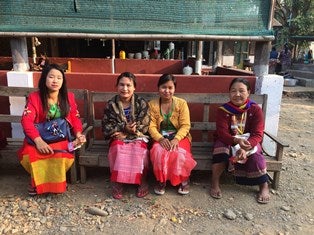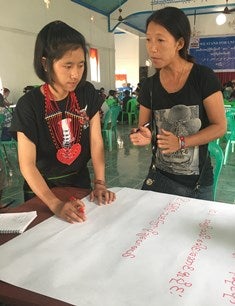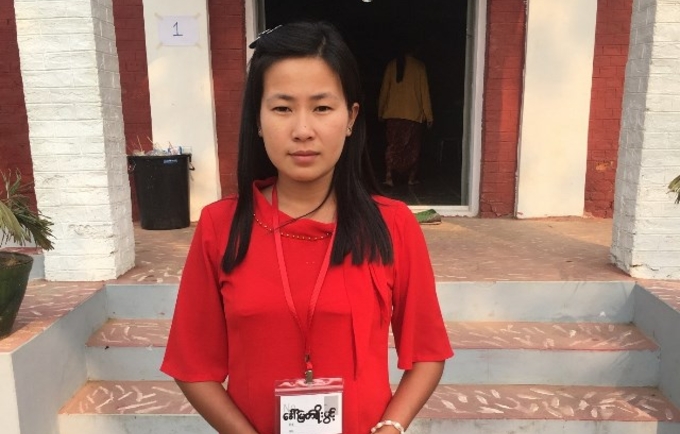NAGA, Myanmar - When they were selecting youth committee members in 23-year-old Myat Noe Pwint’s village, she was told that girls were not competent and would not be qualified to be in leadership positions. Some people in the village nominated girls all the same, but they were rejected for the sole reason of being girls.
“I accepted this at the time. And so did most of the other girls”, says Myat Noe Pwint.
She is one of the over 100 women in Myanmar’s Naga Self-Administered Zone who took part in a UNFPA workshop about women’s empowerment. Held in the town of Tamu, the agenda also covered gender-based violence, women empowerment and leadership, women, peace and security. Emerging from the 3-day experience, Myat Noe Pwint is transformed:
“I’ve got a new attitude. Girls should be accepted for leadership positions if they are qualified. I can’t wait to share my new knowledge about gender equality leadership and with other young people when I get back home.” says Myat Noe Pwint.
Overcoming isolation and under-representation
The Naga Self-Administered Zone sits in a remote north-western corner of Myanmar, next to India’s Nagaland and Assam States. In this extremely isolated area, women from 15 different tribes have overcame transport and communication difficulties to form the Naga Women’s Association in 2016. Together, they are working to increase women’s participation in leadership and decision-making in their communities.

An important part of the training was information and in-depth discussion about national laws and international treaties that cement women’s rights and lack of rights in Myanmar. Building on the United Nations Security Council resolution 1325 on women, peace and security, the programme also included information about the Myanmar peace process. The discussion focused on the importance of women’s participation in the peace process, and the inclusion barriers that Naga women face.
Facing the prejudices within
Another focal area was to examine how violence against women is a product of gender inequality. Participants learned how to support women and girls who have experienced gender-based. They were given a toolbox of actions that they can take back to their communities:
- Psychological first aid
- Physical safety planning
- Peaceful family initiatives
Most of the members are only just beginning to learn about their rights, and many came out of the workshop with unexpected revelations about themselves and their own prejudices.
Khin Ohn Myint recounts that although she does a great deal of charitable work, she has always disliked sex workers, and she once refused to help sex-workers in need of support.
“Now I am really sorry for that. If I had had the knowledge I have today at that time, I would have been both willing and able to help, says Khin Ohn Myint.
The workshop is one of the ways in which UNFPA and UNDP support the association’s capacity to improve women’s position in the community through. UNFPA also provides technical support towards the association’s work on promoting gender-equality at the broader political level in the Naga self-administered zone.
A gender-equality action plan for each tribe

At the end of the three days, each tribe have developed its own action plan for gender equality and women’s empowerment to take back to their communities.
“To me, the most important result of the workshop is to see how women are coming out with a new awareness about their rights. They will be going back to their communities with a new confidence about their ability to be leaders and to stand up against gender-based violence. They will be spreading the word about gender equality to women and men, girls and boys in their villages”, says Mi Mi Thin Aung, UNFPA gender-based violence specialist.

